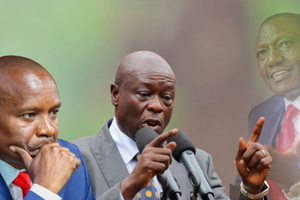
African migrants from the Las Raices camp in La Laguna watch a plane take off at Tenerife North Airport, on the island of Tenerife, Spain, October 25, 2024.
The residents of Paris, France, must be feeling as if they are under invasion. Migrants are spreading mats on the streets and parks and selling souvenirs, food and other wares.
A while back, there was a report in one of the papers that street food vendors were storing food in manholes and sewers. Over in Germany, migrants were banned from a swimming pool after a woman was attacked.
West African migrant arrivals in the Canary Islands, a Spanish territory, in January 2024 grew 1000 per cent compared to 2023, according to online sources, and 78 per cent at half year compared to the previous year. UN reporting shows that generally, Africans are on the move.
In 2020, 19.5 million Africans were living in an African country other than theirs, another 16 million were outside the continent – eight million in Europe, five million in Asia and three million in North America. Anti-migrant violence and sentiment are more noticeable even in previously tolerant European regions such as Scandinavia as un-assimilated migrants become more noticeable with rising numbers.
As a matter of fact, the backlash is huge with violence against migrants in Ireland, UK and other parts of Europe. In the US, a significant part of President-elect Donald Trump’s message was nativist and anti-migrant: sealing the sieve-type southern border and rounding up – with the help of the US military apparently, and deporting the 10 million or so undocumented migrants resident in America.
Prejudice against black migrants
The situation on the Mexican border is of course unsustainable. The illegal migrants have often laid siege on the US and many cross illegally. Genuinely persecuted individuals and those who have a genuine reason to visit America, including for work, have generally been welcome, but this might change with the new government.
Mr Trump’s messaging, going so far to claim that Haitian refugees were eating pets (cats and dogs) is potentially prejudicial to all black migrants. The prejudice against black migrants ignores the fact that the majority of African migrants moved legitimately.
The explanation for, and the solution to, African migration is, I believe, in this little book published 20 years and which I have taken to reading to friends, Fair Trade for All: How Trade Can Promote Development by Joseph Stiglitz and Andrew Charlton. Prof Stiglitz is of course a Nobel Laureate and former Chief Economist of the World Bank in the Clinton era.
In the Foreword, he writes: “The rules which govern world trade affect the livelihoods of the whole planet, and influence the economic development of all nations from Azerbaijan to Zambia.
“About one sixth of the world’s population – mostly in the rich countries – are lucky enough to live in relative wealth, and the rest – mostly in developing countries – live in relative deprivation, if not desperate poverty. You might hope that the world’s trading system went some way to redressing global inequalities which slice our world into the rich, the poor, and the very poor. Yet the opposite is true. The world trading system has protected the interests of the rich countries, at the expense of the poor, and entrenched inequalities.”
He gives a heartbreaking example of agriculture which employs only two per cent of the labour force in rich countries but is protected and farmers paid subsidies, killing agriculture in poor countries where the majority depend on farming.
Exponential increase in trade
In 2020, Politico told the story of Hamidou Bande, a farmer from Burkina Faso. He has a herd of 300 cows which he exports for beef to neighbouring countries but the paper says not a drop of his milk is consumed locally, “sometimes he pours his milk into the soil”.
Burkina Faso, like many West African countries, is a major importer of what Politico described as a “mash-up of milk constituents and vegetable oil”, some type of milk powder from the European Union which is way cheaper than Mamadou’s real milk.
The paper reports that governments in West Africa have not imposed tariffs on this “mash-up” even though dairy is heavily subsidised in the EU because they figure the import is good for the poor. So, there you have nations of livestock farmers which do not drink their own milk but pour it.
Some people from the West recently had an argument on X after one of them described Africans as “borderline retarded” with many feeling that the “borderline” was too generous. While this type of abuse is of course misplaced, the failure by African governments to find a trade formula that allows the continent to trade and develop is difficult to excuse. Without an exponential increase in trade, including intra-African trade, there is absolutely no hope for the continent and its youth.
More of them will keep washing up on European shores to lead a life of spreading mats on the glittering streets of Europe and hawking trinkets to tourists – to the great discomfort of the locals.
Mr Mathiu, a media consultant at Steward-Africa, is a former Editor-in-Chief of Nation Media Group. [email protected]










